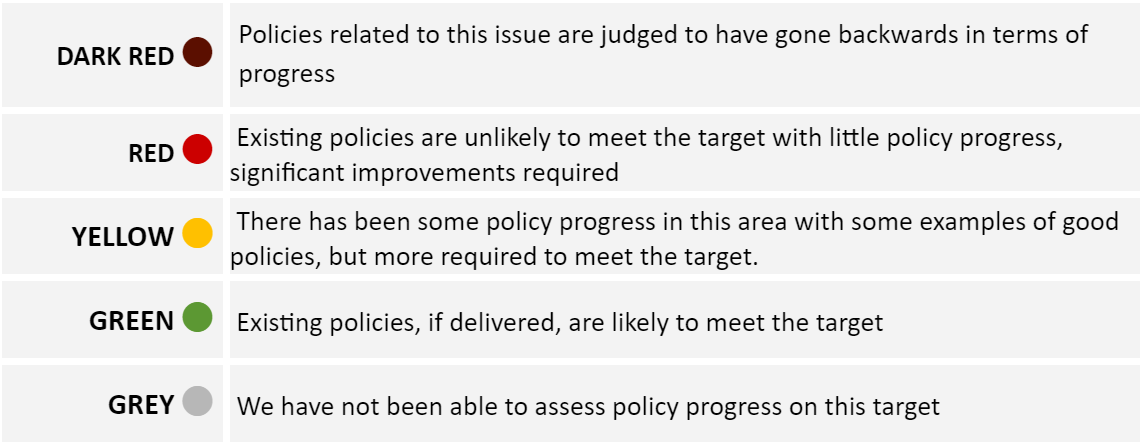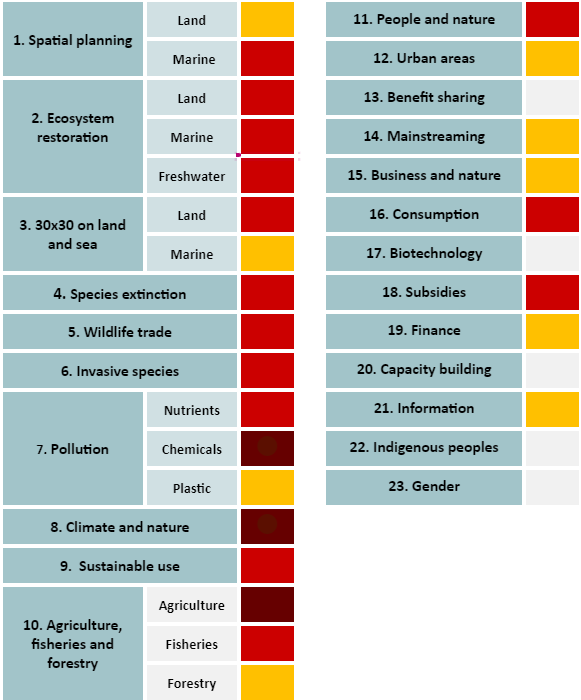14 December 2023
● Progress tracker shows a step change in Government action is needed to meet global nature commitments in the Global Biodiversity Framework, agreed last year at COP15 under the Convention on Biological Diversity.
● Progress is stalling or going backwards in areas including habitat restoration, sustainable agriculture, climate change action, invasive species management and marine conservation.
● Experts call for rapid investment in creating and restoring wildlife habitats, an end to destructive industry in marine protected areas, and rapid investment in natural solutions to pollution.
A year on from a global pledge to halt the decline of nature by 2030, signed by the UK at COP15, nature groups are warning that the UK risks missing the targets.[1]
Led by coalition group Wildlife and Countryside Link, the organisations (including RSPB, the Wildlife Trusts and the National Trust) have released a progress tracker on how Westminster is doing on getting building blocks in place for nature restoration since the conclusion of COP15. The report assesses progress in England of policies to deliver the Global Biodiversity Framework agreed by the UK in 2022 at COP15 in Montreal.
23 targets were agreed with a deadline of 2030. The analysis shows that out of 18 targets assessed, none are currently on track. Seven of the targets are ranked “yellow” denoting some progress with action still required, with the remaining 11 all ranked “red” or “dark red”, meaning that progress has either stalled or is going backwards [2]. The full report can be found here.
Target and indicators marked as red include:
● Protection and restoration of land for nature: to meet the commitment to manage at least 30% of the land and sea for nature by 2030, the network of protected wildlife sites will need to be significantly expanded and improved, but policies are not in place to achieve that goal. Just 38% of sites are currently in good condition. The tracker also points to a failure to ban retail sales of horticultural peat and a lack of strategy to restore degraded landscapes.
● Freshwater: the report says that the 2027 deadline to bring a majority of rivers and streams to ‘Good Ecological Status’ was unlikely to be met and ‘Good Chemical Status’ is not predicted to be achieved until 2063.
● Pesticides, harmful chemicals and nutrients pollution: for nutrients, the report cites the high levels of nitrogen, ammonia and phosphorus as a significant problem for air quality and a direct threat to biodiversity, with the current regulations not doing enough to limit their use, enforce restrictions or incentivise the uptake of less harmful alternatives. The UK’s divergence from EU REACH contributed to chemical pollution also assessed as “dark red”, with fewer and weaker UK chemical protections post-Brexit and reductions in the hazard information that chemicals companies must provide.
Targets analysed as being in the “dark red” include chemical pollution and sustainable agriculture. Backtracking on Net Zero pledges, new oil and gas licences and inadequate use of nature-based solutions put climate change in dark red.
Despite commitments by the government to improving on-farm biodiversity, sustainable agriculture was also analysed as being “dark red”. The report found that the agricultural policies lacked the ambition or the coordination necessary to deliver a widespread shift to nature-friendly “agroecological” farming by the end of the decade and a lack of investment in training or enforcement of existing regulations all contributing to a lack of progress.
However, targets marked as yellow, including improvement of access to nature in urban areas have seen some progress. Due to come into force in January 2024, Biodiversity Net Gain could ensure that habitats are improved across the country, including in urban areas and in new housing development. But potential monitoring and enforcement loopholes, could limit the success of the policy. Natural England’s Green Infrastructure Standards included a commitment that the public should be able to access green space or water, within a 15-minute walk from their home. Whilst these were welcomed, they remain voluntary standards and will have little impact on access to nature unless they become mandatory.
Richard Benwell, CEO of Wildlife and Countryside Link, said:
“The UK was influential in securing the Global Biodiversity Framework, a triumph of environmental diplomacy. Now the Government and all political parties must wake up to enormous challenge and opportunity of halting nature’s decline by 2030.”
“This tracker shows that, since the Environment Act was agreed in 2021, Government environmental ambition has been in hibernation. The policies aren’t in place to meet any of the key pledges made in Montreal last year. A spring revival in investment and action for nature-friendly farming, habitat restoration, and marine protection is needed to meet the targets and bring life to a greener economy.” [2]
Hilary McGrady, Director General of the National Trust, said:
“We’ve all seen the headlines on nature loss in the UK, with species being added to red lists and people seeing the tangible impact of the nature crisis – from seeing fewer hedgehogs to losing valuable local green space. The British public expects better, and with an election coming, all parties need to up their game on nature.”
Beccy Speight, chief executive of the RSPB, said:
“This dismal progress report should set alarm bells ringing for all our political leaders. The action plan agreed in Montreal to halt and reverse the loss of nature by 2030, which the UK championed, was a critical moment for the future of our natural world. Yet success hinges on these global commitments being translated into action at home. The fact that progress towards two-thirds of the targets assessed has either stalled or gone backwards in England must be a wake-up call for politicians across all parties.
It is clear that fighting for the wildlife and greenspaces we love has never been more important. Nature can’t wait and it is only immediate, decisive action that will put us on the right path to restoring nature for the sake of all people and our planet.”
Additional Quotes from The Wildlife Trusts can be found in the footnotes below [3].
With just over 7 years to go until the 2030 deadline, earlier this year over 100 organisations, including the National Trust, The Wildlife Trusts, RSPB and Woodland Trust, launched the Nature 2030 Campaign. The campaign sets out five policies which together will serve to restore nature by 2030. [4] The coalition is calling on all political parties to get behind these proposals in their general election manifestos to deliver on public appetite for greater environmental ambition and to meet binding targets for nature by 2030 and climate by 2050. Members of the public can add their voice to the campaign by signing the open letter here.
Notes to editors:
1. In 2022, at the COP15 gathering in Montreal, the UK signed an international deal to halt and reverse nature loss by 2030. In England, this is underpinned by a legal duty in the Environment Act 2021 to stop the decline of species abundance, and a commitment to protect 30% of the land and sea for nature.
2. The Convention on Biodiversity Global Biodiversity Framework tracker full report can be found here.
a. Global Biodiversity Framework Policy Tracker at a Glance


The tracker was developed by members of the Wildlife and Countryside Link partnership and assesses progress made in England since December 2022 towards 18 of the 23 targets Kunming-Montreal Global Biodiversity Framework Targets. Five targets did not fall within the scope of this research. We have been unable to provide an assessment due to the limited availability of information.
2. Previous research has found very low public satisfaction with Government spending and performance on the environment, with high demand for more ambitious environmental commitments from politicians and only 1 in 10 Brits of the opinion that Government is performing well on environmental issues. Full polling can be found at this link.
3. Additional Quotes:
a. Dr Lissa Batey, head of Marine Conservation at The Wildlife Trusts, says:
“Nature is under pressure as never before and the lack of progress towards its recovery is extremely disappointing. Marine habitats, in particular, are suffering – so we urgently need policies that recognise the competing demands to meet net zero through building offshore wind and grid infrastructure whilst also protecting and restoring the fragile habitats of the seabed. We’ve been promised both marine spatial prioritisation and now a new spatial plan for energy, but what we really need is a joined-up approach with money behind it for both land
and sea – a plan that places nature recovery at its heart. There are just over six years to meet the 2030 targets so urgent action is required right now.”
4. The Nature 2030 campaign is supported by over 100 organisations and calls on political leaders five policies which will support nature’s recovery, these include; more funding for wildlife-friendly farming, making polluters pay, creating more areas well protected for nature, support for green jobs and the introduction of a public right to a healthy environment. More information can be found here.
FACTFILE
● The UK is one of the world’s most nature-depleted countries, more than one in seven native species facing extinction and
an average species decline of 19% since 1970.
● Half of British butterfly species are threatened with extinction
● 70 species of bird are on the red list of conservation concern
● A quarter of UK mammal species are at risk of extinction
● Species abundance targets are currently set with the expectation of decline until 2030 followed by a slow recovery on 2030 levels, which means that by 2042 England could have less wildlife than today
● Against a target of protecting 30% of the land and sea for nature by 2030, just 3% of land and 8% of sea is effectively protected for nature in the UK.
● In 2022, 301,091 sewage spills were reported discharging in England, 14,008 in Scotland and 74,066 in Wales, with discharges of 2.4 million hours across Britain.
● Average UK PM10 particle pollution in 2022 was 13.9μg/m3, against a recognised health standard of 10μg/m3 – a level the Government does not expect to meet until 2040.



Latest Press Releases